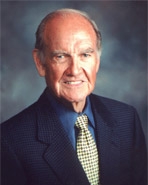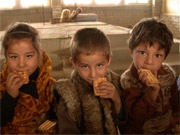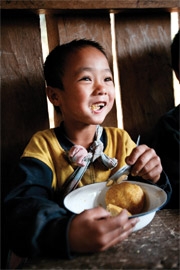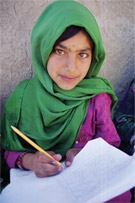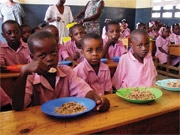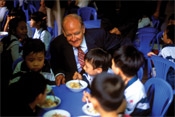Search
www.worldfoodprize.org/index.cfmDole, McGovern named 2008 World Food Prize Laureates
Success of their school-feeding program has enhanced nutrition and education for millions of the world's poorest children | |||||||||||||
Former U.S. Senators Robert Dole and George McGovern have been selected to receive the 2008 World Food Prize for their inspired, collaborative leadership that has encouraged a global commitment to school feeding and enhanced school attendance and nutrition for millions of the world’s poorest children, especially girls. The McGovern-Dole international school-feeding program was established by the United States in 2000. Since then, it has provided meals to feed more than 22 million children in 41 countries and boosted school attendance by an estimated 14 percent overall and by 17 percent for girls. The success of the McGovern-Dole program has also led to dramatically increased international support for expansion of school-feeding operations in developing countries around the world. As one example, the UN World Food Program’s school-feeding operations have nearly doubled since 2001; in 2006 alone, it fed more than 20 million children in 74 countries. A COMMON GOAL TO ERADICATE HUNGER Throughout their distinguished careers, Senator George McGovern and Senator Robert Dole have dedicated themselves to the elimination of hunger at home and abroad. In the 1970s, as leaders of opposing parties, they worked together to reform the Food Stamp Program, expand the domestic school lunch program, and establish the Special Supplemental Food Program for Women, Infants, and Children (WIC). During the following decades, they built a broad, non-partisan consensus for anti-hunger and anti-poverty programs. By the early twenty-first century, the national school lunch program they fostered was providing meals to approximately 30 million children.
In the late 1990s, building upon their successes in reinvigorating U.S. food- and poverty-assistance programs, Senators McGovern and Dole began working toward reviving and strengthening global school feeding, nutrition, and education programs. They were committed to creating a program that would provide poor children with meals at school in countries throughout Africa, Asia, Latin America, and Eastern Europe. President Bill Clinton supported the senators’ initiative and, in July 2000, his administration established a two-year pilot program, the Global Food for Education Initiative (GFEI), funded at $300 million. The U.S. Department of Agriculture administered the program, which initially provided nutritious meals for children in 38 countries. Under the GFEI, the U.S. Department of Agriculture provided surplus agricultural commodities to school-feeding programs operated by international organizations including the World Food Program, CARE, Catholic Relief Services, Mercy Corps, World Vision, Joint Aid Management, and the American Red Cross, as well as to the governments of countries that had made commitments to providing universal education.
STEPS TOWARD ENDING THE CYCLE OF HUNGER AND POVERTY
Hungry children have difficulty learning, and malnutrition often leads to permanently stunted physical and cognitive development. By exerting tireless and creative leadership, Senators McGovern and Dole took significant steps toward ending the cycle of hunger and poverty that affects as many as 300 million chronically malnourished children. School enrollment increased as a result of the GFEI, particularly for girls. More broadly, the benefits of school-feeding programs have been shown to include: improved cognition and better all-round academic performance; increases in local employment and parental involvement in school activities; and participation by local governments in supporting school-feeding efforts. With the strong support and urging of Senator McGovern and Senator Dole, Congress passed legislation establishing a permanent international school feeding program. In May of 2002, President George W. Bush officially signed into law the George McGovern-Robert Dole International Food for Education and Child Nutrition Program (known as the McGovern-Dole Program). This hallmark effort has fed children in schools across the globe every year since then. TRANSFORMING LIVES ACROSS THE GLOBE
Since its inception as a pilot program, the McGovern-Dole Program has provided meals to 22 million children in 41 countries, including Afghanistan, Cambodia, Eritrea, Ghana, Kyrgyzstan, Liberia, Malawi, Moldova, Nicaragua, Niger, and Pakistan. The program has boosted school attendance by an estimated 14 percent overall, and by 17 percent for girls. The McGovern-Dole Program has had an even wider impact by reigniting global interest in supporting school feeding, which had become a relatively low international priority by the 1990s. Leaders of various international organizations cited the McGovern-Dole Program as the key factor that allowed organizations to increase their school-feeding operations and also assess the impact of those programs. The proven success encouraged increased commitments from various donor countries for school feeding. Development leaders also renewed their interest in and support for school feeding. In 2002, the G8 and the New Partnership for Africa’s Development (NEPAD) listed school feeding as a specific intervention in their action plans for poverty alleviation. In 2005, school-feeding was highlighted in the UN Millennium Project’s 10 key recommendations for achieving the Millennium Development Goals by 2015. The EU, Canada, and Japan are now among the major providers of resources to global school-feeding programs. With increased funding, the World Food Program’s global school-feeding initiative – the world’s largest such program – was able to double its operations between 2000 and 2005. By 2006, its efforts reached more than 20 million children in 74 countries. Eleven million of these were in Africa, and just over 50 percent of them were girls. BENEFITTING SCHOOL AGE GIRLS
The McGovern-Dole Program emphasizes benefiting girls and young women and overcoming gender inequalities in literacy and access to education. Traditionally, young girls in many developing countries are often kept out of school to work in the home performing child care, elder care, and other domestic chores, or are sent out to earn a living. However, when meals are available at school, and/or take-home rations are available to the families of students attending school, girls and young women are much more likely to be allowed—even encouraged—to enroll, with numerous benefits. For example, studies in Mexico have shown that school-feeding programs there have led to girl students’ finishing school at higher rates, and also marrying later in life and having fewer children.
A VARIETY OF AID THROUGH FOOD COMMODITIES
Thousands of tons of wheat, soybeans, corn, wheat flour, cornmeal, corn-soy blend, rice, lentils, dry beans and vegetable oil have been shipped to participant countries through the auspices of the McGovern-Dole Program. These resources are used by local officials to provide school meals and snacks to children. The McGovern-Dole Program is moving toward increasing the amount of cash awarded while also implementing a new bartering system to diversify the commodities and foodstuffs that the program provides. Organizations and governments often combine school-feeding resources and programs with interventions that include: construction or upkeep of school kitchens and sanitation facilities; teacher and staff training; HIV/AIDS education; de-worming and inoculations; and local purchase of foods to strengthen markets. These efforts in turn have a multiplier effect of enhancing education, community development, health, and gender equity. ELIMINATING HUNGER IN THE TWENTY-FIRST CENTURY
The path-breaking accomplishments of the 2008 World Food Prize Laureates – Senator George McGovern and Senator Robert Dole – continue to inspire leaders in the United States and other countries to move their efforts forward to ever greater heights, with the goal to end world hunger. For the millions of children it has touched in the past, and the millions who will benefit in the future, the McGovern-Dole Program and other collaborative school-feeding initiatives can break the cycle of hunger and poverty and provide life-altering opportunities through education and improved health.
| |||||||||||||
| Senator Robert Dole and Senator George McGovern will be presented the $250,000 | |||||||||||||
|
|




